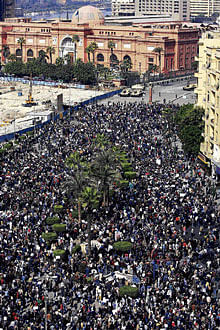Million voices shake Mubarak

Their mood was jubilant, as though they had achieved their goals, even though Mubarak remained in power a day after the Egyptian military emboldened the protesters by saying they would not use force against them and the president’s most trusted adviser offered to negotiate with his adversaries.
There were reports that the government was seeking to choke off access to the capital to thwart the demonstrators’ ambitions for the most decisive show of strength so far. But those efforts seemed to have only a limited effect.
Indisputably, though, the scale of the protest was far bigger and more tumultuous than any in the previous week. Tens of thousands of people also took to the streets of Alexandria, Egypt’s second-largest city, north of Cairo on the Mediterranean coast.
The crowd protesting in Cairo offered a remarkable tapestry of Egypt’s society, from the most Westernised to the most traditional, from young women with babies to old men with canes. “Look at the faces of the old men — they are young again,” said Ahmed Zemhom, 37, a former math teacher who makes a living as a cabdriver.
Seeking to impose some kind of order, the military set up checkpoints to search people entering the square, presumably for hidden weapons, separating them by gender so that women could be patted down only by other women. But there were no immediate reports of clashes, and little sign of any security police.
Weakening hold
The fast-moving developments appeared to weaken Mubarak’s grip on power just two weeks after a group of young political organisers called on Facebook for a day of protest inspired by the ouster of another Arab strongman, in Tunisia.
A Western diplomat said on Tuesday that there were preliminary reports that Egypt’s top military and political leaders were working on a plan to usher President Mubarak from power. The diplomat, who spoke anonymously because of the extraordinary sensitivity of the situation, said that the newly appointed vice president, Omar Suleiman, was in discussions with military officials to ease Mubarak from office and begin the transition to an interim government.
It was not immediately clear what role the newly appointed United States envoy, Frank G Wisner, was playing in the discussions.
If that belief is borne out by events, however, it remained to be seen whether protesters would be satisfied by Mubarak’s departure or would demand more far-reaching change, as demonstrators in Tunisia did after its strongman president, Zine el-Abidine Ben Ali, fled in mid-January.
Trial demand
In Tahrir, or Liberation, Square, the chants of the huge crowd suggested that the demonstrators would not stop at Mubarak’s departure. “The people of Egypt want the president on trial,” some chanted for the first time, while others chorused: “The people of Egypt want the government to fall.”
“Nobody wants him, nobody,”said El-Mahdy Mohamed, one of the demonstrators. “Can’t he see on the TV what’s happening?”
As opposition groups sought to stake out positions, Mohamed ElBaradei, the former head of the International Atomic Energy Agency and a Nobel laureate who has emerged as a potential rallying point for opposition, said on Tuesday that Mubarak must leave the country before any dialogue could start between the opposition and the government.
Deccan Herald is on WhatsApp Channels| Join now for Breaking News & Editor's Picks